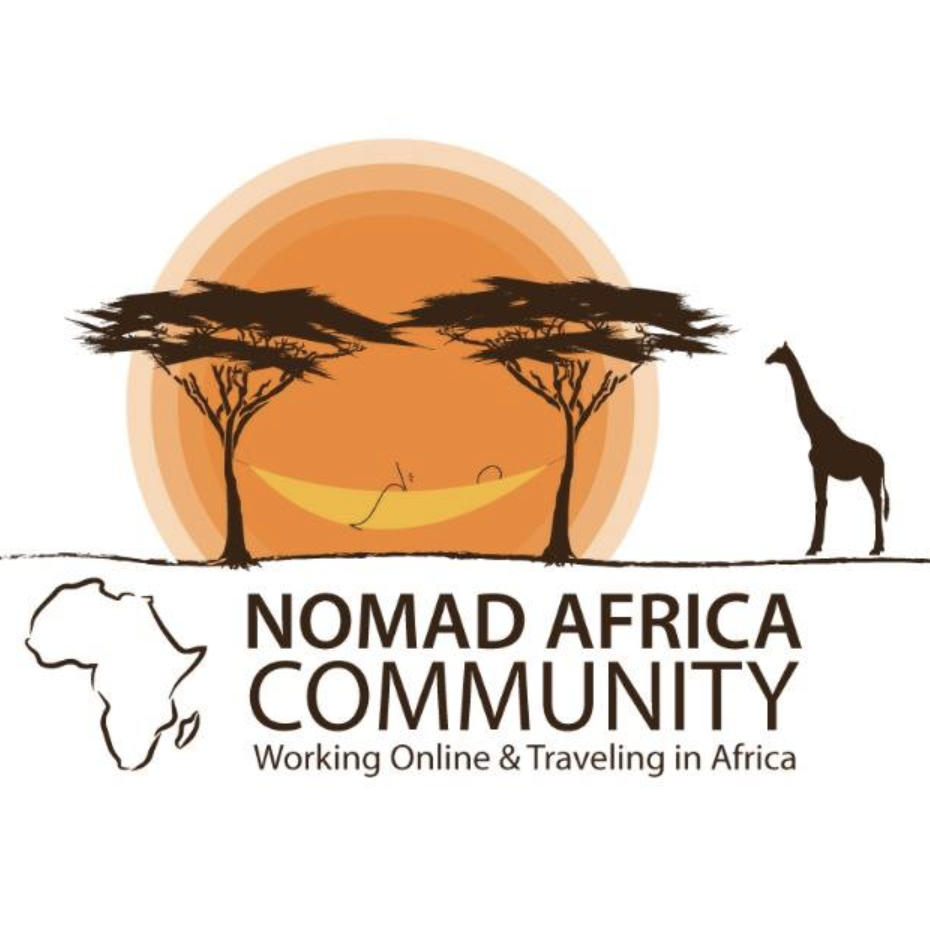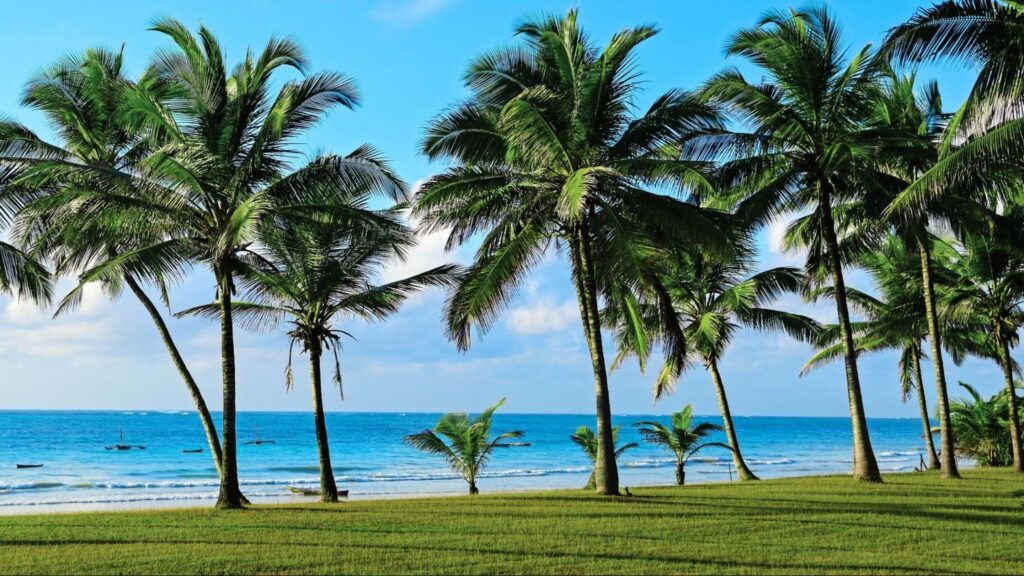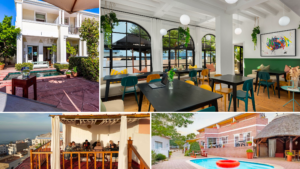Tunisia is a country in North Africa that has become an increasingly popular destination for digital nomads. With its warm climate, stunning coastline, and affordable cost of living, Tunisia offers a unique experience for remote workers looking to explore a new culture while still being able to work.
If you’re a digital nomad considering Tunisia as your next destination, you’ll be happy to know that there are plenty of resources available to help you make the most of your stay. From coworking spaces to affordable accommodations, there are many options to choose from that cater specifically to the needs of remote workers.
Additionally, there are many online communities and forums where you can connect with other digital nomads who have lived and worked in Tunisia, allowing you to get insider tips and advice on everything from the best places to eat to the most scenic spots to explore.
Jump To:
Things to Do in Tunisia | Destinations | Internet | Co-Working Spaces | Coliving Spaces | Best Times to Visit | Visas | Cost of Living | How to Get There | Culture and Lifestyle | Safety and Security | Frequently Asked Questions
| Main Languages | Arabic, French |
| Capital city | Tunis |
| Main airport(s) | Tunis-Carthage International Airport, Enfidha-Hammamet International Airport, Monastir Habib Bourguiba International Airport |
| Currency | Tunisian Dinar (TND) |
| Time Zone | Central European Time (CET, GMT+1) |
| Plug Socket Type | Type C and E |
| Best time(s) to Visit | April to May and October to November |
| Internet Quality | Good |
| Highlights | Rich History; Sahara Desert Adventures; Charming Coastal Towns |
Things to Do in Tunisia
Tunisia is a perfect destination for digital nomads who want to explore Africa while working remotely. The country has a rich cultural heritage, beautiful beaches, and plenty of family-friendly attractions. Here are some of the top things to do in Tunisia:
Visit Ancient Ruins
Tunisia is home to some of the most impressive ancient ruins in the world. The most famous of these is the Roman amphitheater in El Djem, which is one of the largest in the world. The amphitheater was built in the 3rd century and could hold up to 35,000 spectators. Other must-see ancient ruins include the Roman city of Dougga, the Phoenician city of Carthage, and the Kerkouane ruins.
Explore the Bardo Museum
The Bardo Museum is one of the most important museums in Africa and is home to an impressive collection of Roman mosaics, Islamic art, and ancient artifacts. The museum is located in Tunis and is housed in a 15th-century palace. It’s a must-visit for anyone interested in history and art.
Relax in a Hammam
A hammam is a traditional Tunisian bathhouse where you can relax and unwind. Hammams are a popular pastime in Tunisia, and there are many to choose from. The most famous hammam in Tunis is the Hammam Zitouna, which dates back to the 9th century.
Enjoy the Beaches
Tunisia has some of the most beautiful beaches in the world. The most popular beaches are located in the resort town of Hammamet, but there are also many other hidden gems to discover. Some of the best beaches include Sidi Bou Said, La Marsa, and Mahdia.
Family-Friendly Attractions
Tunisia is a great destination for families with children. There are many family-friendly attractions to choose from, including the Carthage Land amusement park, the Belvedere Zoo, and the Medina of Tunis. The Medina of Tunis is a UNESCO World Heritage Site and is home to many traditional markets and shops.
Entertainment
Tunisia has a vibrant entertainment scene, with many nightclubs, bars, and restaurants to choose from. The most popular nightlife destinations are located in Tunis and Hammamet, but there are also many other hidden gems to discover. Some of the best places to go include the Le Carpe Diem nightclub, the La Closerie restaurant, and the Café des Délices.
In conclusion, Tunisia has something to offer for every digital nomad. Whether you’re interested in history, art, beaches, or entertainment, you’re sure to find something that suits your interests.
Best Destinations for Digital Nomads
Tunisia is a great destination for digital nomads looking for affordable living, a supportive environment, and modern amenities. Here are some of the best places to live and work in Tunisia:
Tunis
Tunis is the capital of Tunisia and a great place for digital nomads. The city has a mix of traditional and modern architecture, making it a unique place to live. There are many co-working spaces and cafes in Tunis where you can work, and the city has a supportive environment for entrepreneurs. The cost of living is relatively low, making it an affordable place to live.
Sousse
Sousse is a coastal city in Tunisia and a popular destination for tourists. The city has a relaxed atmosphere and a beautiful beach, making it a great place to live and work. There are many co-living spaces and co-working spaces in Sousse, and the cost of living is relatively low. The city also has a supportive environment for entrepreneurs and digital nomads.
Hammamet
Hammamet is another coastal city in Tunisia and a great place for digital nomads. The city has a beautiful beach and a relaxed atmosphere, making it an ideal place to live and work. There are many co-working spaces and cafes in Hammamet where you can work, and the cost of living is relatively low. The city also has a supportive environment for entrepreneurs.
Djerba
Djerba is an island off the coast of Tunisia and a popular destination for tourists. The island has a relaxed atmosphere and a beautiful beach, making it a great place to live and work. There are many co-living spaces and co-working spaces in Djerba, and the cost of living is relatively low. The island also has a supportive environment for entrepreneurs and digital nomads.
Overall, Tunisia is a great destination for digital nomads looking for affordable living, a supportive environment, and modern amenities. With many co-working spaces, cafes, and co-living spaces, there are plenty of options for workspace. The cost of living is relatively low, making it an affordable place to live. With a supportive environment for entrepreneurs and digital nomads, Tunisia is a practical choice for those looking to live and work in North Africa.
Internet Connectivity
As a digital nomad, reliable internet connectivity is essential. Tunisia offers decent internet connectivity, with an average broadband speed of 6.97 Mbps and mobile data speeds of 22.35 Mbps. This means that you can easily stay connected and work remotely in most parts of the country.
In Tunisia, you can find free public Wi-Fi hotspots in cafes, restaurants, and hotels. You can also purchase a local SIM card and use mobile data to stay connected. The two main mobile network operators in Tunisia are Orange and Ooredoo, and they offer various data plans to suit your needs.
It’s important to note that internet connectivity may be slower in some rural areas, so it’s best to check the coverage before you head out. Additionally, power outages are not uncommon in Tunisia, so it’s a good idea to have a backup power source, such as a portable charger or a power bank, to ensure uninterrupted work.
Overall, Tunisia offers decent internet connectivity, and with a little bit of planning and preparation, you can easily stay connected and work remotely while enjoying all that this beautiful country has to offer.
Coworking Spaces
Tunisia is a great destination for digital nomads who are looking for a comfortable and affordable workspace. Coworking spaces are becoming increasingly popular in Tunisia, and there are several options available for digital nomads who want to work in a collaborative environment.
Co-Working Spaces
Co-working spaces in Tunisia offer a range of facilities to digital nomads, including high-speed internet, printing and scanning services, meeting rooms, and kitchen facilities. Some of the most popular co-working spaces in Tunisia include:
-
Wiki Startups Tunis – This co-working space is located in the heart of Tunis and offers a range of facilities to digital nomads, including high-speed internet, printing and scanning services, meeting rooms, and kitchen facilities.
-
Café Coworking Tunis – This co-working space is located in the trendy neighborhood of La Marsa and offers a relaxed and comfortable environment for digital nomads. The space is equipped with high-speed internet, printing and scanning services, and a kitchen.
-
Cocoon Coworking Space – This co-working space is located in Sfax and offers a range of facilities to digital nomads, including high-speed internet, printing and scanning services, meeting rooms, and kitchen facilities.
Workspace
In addition to co-working spaces, there are also several other options for digital nomads who are looking for a workspace in Tunisia. Some of the most popular options include:
-
Regus Tunis – Regus is a global provider of flexible workspace solutions, and they have several locations in Tunisia. Their workspaces are equipped with high-speed internet, meeting rooms, and kitchen facilities.
-
Tunisia Business Center – Tunisia Business Center is a modern and fully equipped business center located in the heart of Tunis. They offer a range of facilities to digital nomads, including high-speed internet, printing and scanning services, meeting rooms, and kitchen facilities.
-
Le 15 Business Center – Le 15 Business Center is a modern and fully equipped business center located in the heart of Tunis. They offer a range of facilities to digital nomads, including high-speed internet, printing and scanning services, meeting rooms, and kitchen facilities.
Overall, Tunisia has a range of options for digital nomads who are looking for a comfortable and affordable workspace. Whether you prefer a co-working space or a traditional workspace, there are plenty of options available to suit your needs.
Coliving Spaces
Tunisia offers a variety of coliving spaces for digital nomads and remote workers. These spaces are designed to provide a comfortable and collaborative environment for like-minded individuals to live and work together. Here are a few options to consider:
1. Nomad Stays
Nomad Stays offers a variety of coliving spaces in Tunisia, including in the capital city of Tunis and the coastal city of Sousse. Their spaces are designed to be comfortable and affordable, with high-speed internet, a workspace, and communal areas for socializing and networking.
2. Digital Nomads Lesvos
Located in the town of Petra, Digital Nomads Lesvos is a coliving space that offers a unique experience for digital nomads. The space is located on the island of Lesvos, which is known for its natural beauty and relaxed lifestyle. In addition to a workspace and high-speed internet, Digital Nomads Lesvos also offers yoga classes and opportunities to get involved in volunteering.
3. SunDesk
SunDesk is a coliving space located in the coastal town of Taghazout, just a short drive from the city of Agadir. The space offers a workspace, high-speed internet, and a rooftop terrace with stunning views of the ocean. SunDesk also offers surf lessons and other outdoor activities for those looking to take a break from work.
4. Coconat
Although not located in Tunisia, Coconat is a popular coliving space in nearby Germany that is worth considering. Located in a rural area outside of Berlin, Coconat offers a peaceful and inspiring environment for digital nomads. The space offers a variety of workspaces, including a coworking barn and a greenhouse, as well as opportunities for hiking and other outdoor activities.
When choosing a coliving space in Tunisia, it is important to consider factors such as location, price, and amenities. With a variety of options available, there is sure to be a space that meets the needs of any digital nomad or remote worker.
Best Times to Visit
Tunisia is a great destination for digital nomads looking to experience a unique blend of North African and Mediterranean culture. The country boasts a warm and sunny climate, making it an ideal spot for those looking to escape cold winters or rainy seasons.
Weather
The best time to visit Tunisia is during the spring (April/May) or autumn (October/early November). During these months, the temperature is mild and comfortable, making it perfect for outdoor activities. The average temperature during these months is around 20-25°C (68-77°F).
In the summer months, Tunisia can get very hot, with temperatures reaching up to 40°C (104°F). This can make outdoor activities uncomfortable and even dangerous for some people. However, if you are a fan of the beach, then the summer months are perfect for you.
During the winter months, Tunisia can get quite cold, with temperatures dropping to around 10°C (50°F). However, if you are used to colder temperatures, then this can be a great time to visit, as the country is less crowded and prices are generally lower.
Worst Times to Visit
The worst time to visit Tunisia is during the summer months (July and August), as the temperature can get extremely hot and humid. This can make outdoor activities uncomfortable and even dangerous for some people. Additionally, this is the peak tourist season, so prices are generally higher and popular destinations can be crowded.
Another time to avoid is during the winter months (December to February), as the temperature can get quite cold and rainy. This can make outdoor activities difficult and unpleasant. Additionally, many businesses and attractions may be closed during this time.
Overall, the best time to visit Tunisia is during the spring or autumn, when the weather is mild and comfortable. However, if you are a fan of the beach, then the summer months can be great, but be prepared for the heat. If you are looking for a quieter and more affordable trip, then the winter months can be a good option, but be prepared for colder temperatures and the possibility of rain.
Tourist and Digital Nomad Visas
Tunisia offers a 90-day visa-free stay for many nationalities including citizens of the United States, Canada, and EU countries. If you plan to stay longer, you can apply for a tourist visa at the Tunisian embassy or consulate in your home country. The tourist visa allows you to stay up to 6 months in Tunisia. You can also extend your stay for another 3 months by applying for a visa extension at the local police station.
For digital nomads, Tunisia does not offer a specific visa, but you can apply for a long-stay visa for work purposes. The long-stay visa allows you to stay up to 1 year in Tunisia and work remotely for your clients or employer abroad. To apply for a long-stay visa, you need to provide the following documents:
- A valid passport with at least 6 months validity
- A completed visa application form
- A letter from your employer or client abroad stating the purpose of your stay in Tunisia and the duration of your contract
- A copy of your bank statements showing that you have sufficient funds to support yourself during your stay in Tunisia
- A copy of your travel itinerary and hotel reservations
The visa application process can take up to 4 weeks, so plan accordingly. Once you arrive in Tunisia, you need to register with the local police station within 30 days of your arrival.
Overall, Tunisia offers a relatively easy and straightforward visa process for tourists and digital nomads. With its affordable cost of living, beautiful beaches, and rich cultural heritage, Tunisia is a great destination for both short-term and long-term stays.
Cost of Living
Tunisia is a cost-effective destination for digital nomads looking to work and live comfortably. The cost of living in Tunisia is relatively low compared to other countries, making it an affordable option for those on a budget.
Affordability
The average cost of living in Tunisia is $1,695 per month, which includes accommodation, food, transportation, and entertainment expenses. This price can vary depending on the city you choose to live in and your lifestyle choices.
Price/Quality Ratio
Tunisia offers a good price/quality ratio, meaning you can enjoy a high standard of living without breaking the bank. You can find affordable accommodation options, delicious local cuisine, and a vibrant culture to explore.
Cost-Effective Price
The cost of living in Tunis, the capital city of Tunisia, is $1,263 per month. This includes rent for a one-bedroom apartment, which costs around $202 per month, a meal at a local restaurant, which costs around $11, and a beer, which costs around $0.92.
Overall, Tunisia is an affordable destination for digital nomads looking to live and work remotely. With a low cost of living, good price/quality ratio, and cost-effective prices, Tunisia is a great option for those looking for an adventure without breaking the bank.
How to Get There
Tunisia is accessible by air, land, and sea. The main international airport is Tunis-Carthage International Airport, located approximately 8 km northeast of the city center. Several airlines operate regular flights to and from Tunis, including Tunisair, Air France, Lufthansa, and Turkish Airlines.
If you prefer to travel by land, you can take a bus or a taxi from neighboring countries such as Algeria and Libya. The bus network is extensive and affordable, with several companies operating daily services to and from major cities in Tunisia.
Taxis are also a popular mode of transportation in Tunisia. They are relatively cheap, and you can easily hail one on the street. However, be sure to negotiate the fare before getting into the taxi to avoid any surprises. Alternatively, you can use ride-hailing apps such as Bolt or the local version called “Taxi Secure” to book a taxi.
If you’re on a budget, public transportation is a good option. The national railway company, SNCFT, operates trains between major cities in Tunisia. The trains are comfortable, air-conditioned, and affordable. Buses are also available, with several companies operating services to and from major cities.
Overall, Tunisia is a relatively easy country to navigate, with several transportation options available. Whether you prefer to fly, take a bus, hail a taxi, or use public transportation, you can easily get to and around Tunisia.
Culture and Lifestyle
Tunisia is a country that sits at the crossroads of North Africa and Europe, with a rich history and culture that reflects both its Western and Mediterranean influences. The country has a diverse population, with a mix of Arab, Berber, and European heritage, and a long tradition of entrepreneurship and innovation.
Culture and History
Tunisia has a rich cultural history that dates back to the ancient city of Carthage, which was founded in the 9th century BCE. The country was later conquered by Rome and became a center of trade and commerce in the Mediterranean. Today, visitors can explore the ancient ruins of Carthage and other historic sites, such as the Bardo Museum, which houses an impressive collection of Roman mosaics and other artifacts.
Cuisine
Tunisian cuisine is a blend of Arabic, Mediterranean, and Berber influences, with a focus on fresh, locally sourced ingredients and bold flavors. Street food is a popular option for both locals and visitors, with vendors selling everything from falafel and shawarma to spicy harissa and brik, a crispy pastry filled with egg and tuna. For a more upscale dining experience, there are plenty of local restaurants that serve traditional Tunisian cuisine, such as couscous, tajine, and brik.
Art and Music
Tunisia has a vibrant arts and music scene, with a long tradition of poetry, storytelling, and music. The country is known for its traditional folk music, which features instruments such as the oud, ney, and darbuka. There are also plenty of contemporary artists and musicians who are making waves in Tunisia and beyond, with galleries and music venues showcasing their work.
Festivals
Tunisia is home to a number of festivals throughout the year, celebrating everything from music and film to traditional crafts and cuisine. One of the most popular festivals is the Carthage International Festival, which takes place every summer and features performances by local and international artists. Other festivals include the Sfax International Olive Festival, the Tozeur Dates Festival, and the Kairouan Carpet Festival.
Overall, Tunisia offers a rich and diverse cultural experience for digital nomads and travelers alike. With its mix of ancient history, vibrant cuisine, and lively arts scene, there’s something for everyone to enjoy in this North African gem.
Safety and Security
Tunisia is generally a safe country to visit, but travelers should be aware of the potential risks. The country has experienced some terrorist attacks in recent years, particularly targeting tourist sites. Visitors are advised to exercise caution and avoid large crowds, political events, and demonstrations. It is also recommended to stay away from the border regions with Libya and Algeria due to the risk of terrorism.
Travelers should be aware of the possibility of petty crime, such as pickpocketing and theft. It is advisable to keep valuables out of sight, avoid carrying large amounts of cash, and use a money belt. In addition, travelers should be careful when using ATMs and avoid walking alone at night.
Road safety can be a concern in Tunisia, with poor road conditions, reckless driving, and a high number of accidents. It is recommended to avoid driving at night and to use a reputable taxi service or public transportation.
Health risks are also present in Tunisia, including the risk of waterborne diseases such as cholera and typhoid fever. Travelers should drink bottled water and avoid consuming raw or undercooked food.
Overall, visitors to Tunisia should exercise caution and be aware of their surroundings. By taking appropriate safety measures and avoiding high-risk areas, travelers can have a safe and enjoyable trip to this fascinating country.
Frequently Asked Questions
What are the best neighborhoods to live in as a digital nomad in Tunis?
As a digital nomad, you want to live in a neighborhood that is safe, affordable, and has good internet connectivity. Some of the best neighborhoods to live in as a digital nomad in Tunis are La Marsa, Sidi Bou Said, and Carthage. These neighborhoods have a good selection of cafes, restaurants, and coworking spaces.
What are the pros and cons of working remotely in Tunisia?
Tunisia is a great destination for digital nomads due to its low cost of living, good internet connectivity, and friendly locals. However, there are some downsides to working remotely in Tunisia, such as the language barrier, cultural differences, and occasional power outages.
Is Tunisia a good destination for digital nomads?
Yes, Tunisia is a great destination for digital nomads due to its low cost of living, good internet connectivity, and friendly locals. Tunisia has a rich culture and history, and there are plenty of things to see and do in the country.
What is the average cost of living for digital nomads in Tunis?
The cost of living in Tunis is relatively low compared to other cities in Europe. A digital nomad can expect to spend around $1,000 to $1,500 per month on living expenses, including accommodation, food, and transportation.
What are some resources for finding accommodation as a digital nomad in Tunisia?
There are several resources for finding accommodation as a digital nomad in Tunisia, such as Airbnb, Booking.com, and NomadX. These platforms offer a range of accommodation options, from apartments to villas and hotels.
What are some popular coworking spaces in Tunis for digital nomads?
Tunis has a growing coworking scene, and there are several coworking spaces that are popular among digital nomads, such as Cogite, El Space, and Coworking Tunisia. These spaces offer a range of amenities, including high-speed internet, meeting rooms, and networking events.









